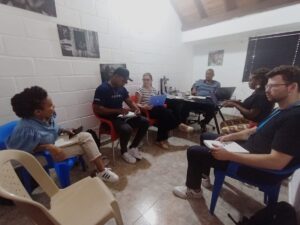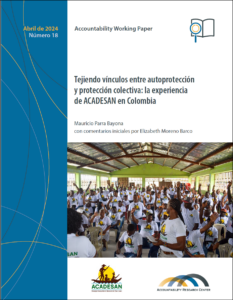Who are we?
ARC is a research center at American University that works with civil society organizations and policy makers committed to accountability. Our goal is to generate and support research and analysis on innovative practice in public participation, citizen oversight and open government, and public accountability.
Context
Colombia has a strong legal and institutional framework to promote citizen participation, oversight, and accountability, but it is unevenly applied. Several policies and reforms—such as the mechanisms of the 2016 Peace Agreement, development policies for the Colombian Pacific, and an institutional framework for equality and equity—constitute a window of opportunity to strengthen accountability.
About our work in Colombia
ARC works with ethnic organizations, citizen watchdogs, civil society organizations, and government agencies to develop independent monitoring of public policies to support informed citizen participation. We take a systemic approach that integrates local, national, and international arenas.
Mariana Cepeda and Helmer Quiñones, our Bogotá-based researchers, collaborate closely with our partners and allies in Colombia to provide technical assistance, accompaniment and applied research. They are supported by several expert consultants and ARC Director Jonathan Fox.
In 2025-26, most of ARC´s work in Colombia is in collaboration with the Foro Interétnico Solidaridad por Chocó (FISCH) and the Consejo Comunitario General del San Juan (ACADESAN).
Focus areas
Public oversight and monitoring of the Peace Agreement and humanitarian crisis
Since 2023, thanks to the support of Humanity United, ARC has been providing technical assistance to the Inter-Ethnic Solidarity Forum of Chocó (FISCH) coalition. FISCH brings together 123 ethnic organizations in the department of Chocó.
One of FISCH’s strategies to overcome social and armed conflicts is the design and implementation of the Peace Observatory of the Interethnic Forum in Chocó. The Observatory monitors the implementation of the Peace Agreement´s ethnic chapter, including regional development programs in Chocó (PDETs) and a humanitarian agreement (Acuerdo Humanitario ¡Ya!).

Colleagues from FISCH, ARC, the Kroc Institute and the UN Verification Missionmeet in Chocó to develop action plans for the Observatory.
Research on measures to protect human rights
 Since 2023, in response to concerns of our partners and allies, ARC has been supporting applied research on government measures for collective protection of social organizations. This work documents grassroots advocacy strategies and analyzes bottlenecks in the implementation of policy responses, in collaboration with the Community Council of San Juan (ACADESAN).
Since 2023, in response to concerns of our partners and allies, ARC has been supporting applied research on government measures for collective protection of social organizations. This work documents grassroots advocacy strategies and analyzes bottlenecks in the implementation of policy responses, in collaboration with the Community Council of San Juan (ACADESAN).
An ARC Accountability Note published in April 2024, “Collective Protection for Communities and Rights Defenders at Risk: Lessons from Grassroots Advocacy in Colombia,” documents ACADESAN’s grassroots advocacy campaign to get the government to commit to 50 collective protection measures in for communities in the conflict-affected region of the San Juan River. Monitoring the implementation of those commitments is ongoing.
ARC’s work on collective protection also involves technical support to FISCH in co-convening several learning exchanges among ethno-territorial organizations in the Colombian Pacific. The reflections of these organizations on their experiences of engaging with the Colombian government around collective protection are captured in a Learning Exchange Report, Collective Human Rights Protection in Colombia: Afro-Colombian and Indigenous Experiences in the Pacific Region (2025).
“Locally-led” development and USAID funding in Colombia
Before January 2025, USAID had committed to significantly increasing the proportion of its funding going to national organizations and to include “locally-led” approaches in up to half of its programs. Colmbia was the largest recipient of USAID funding in Latin America.
Informed participation by Colombian civil society actors as “local” stakeholders in development initiatives required an understanding of USAID funding priorities and trends. Between 2023 and 2025, in consultation with partners and allies, ARC used official US public data sources to study USAID’s outreach practices, track its sectoral priorities, and identify localization patterns in Colombia.
Find out more about the study on the Open Government and Locally-Led Development page, in this July 2024 article in Development Policy Review.
ARC's publications on Colombia
Collective Human Rights Protection in Colombia: Afro-Colombian and Indigenous Experiences in the Pacific Region (Mariana Cepeda Villareal, Learning Exchange Report 2025)
Open Government and US Development Co-operation in Colombia: Lessons for Locally led Development (Jonathan Fox and Jeffrey Hallock, article in Development Policy Review, 2024)
Collective Protection for Communities and Rights Defenders at Risk: Lessons from Grassroots Advocacy in Colombia (Mauricio Parra Bayona, Elizabeth Moreno Barco, Jonathan Fox, Accountability Note, 2024)
Tejiendo vínculos entre autoprotección y protección colectiva: la experiencia de ACADESAN en Colombia (Mauricio Parra Bayona, Accountability Working Paper, 2024)
How More Open Government Can Bolster USAID’s Localization Agenda (Jonathan Fox and Jeffrey Hallock, From Poverty to Power blog, 2023)
Delivering Collective Afrodescendant Land Rights: Mutual Empowerment in Colombian State-Society Coalitions 1995-2003 (Helmer Eduardo Quiñones Mendoza, Noah Rosen, and Jonathan Fox, ARC Case Study, 2022).
Surveillance without Control? Citizen Oversight in Colombia and Ecuador (Héctor Manuel Gutiérrez Magaña and Mariana Cepeda Villarreal, Accountability Keywords blog, 2022).
The Ethnic Chapter of the Peace Accord Five Years On: An Independent Assessment (Helmer Eduardo Quiñones Mendoza, Accountability Note, 2022).
El control social en Colombia: Un balance sobre las veedurías ciudadanas (Mariana Cepeda Villarreal, Accountability Working Paper, 2022)
Top-Down Accountability versus Democracy: The Case of the Colombian Attorney General’s Office (Charles H. Roberts, Accountability Keywords blog, 2021).
Citizen Participation in Auditing: The Agenda for the Future (Marcos Mendiburu, ARC Learning Exchange Report, 2021).
Citizen Participation in Supreme Audit Institutions in Latin America: Progress or Impasse? (Marcos Mendiburu, Accountability Working Paper, 2020).
